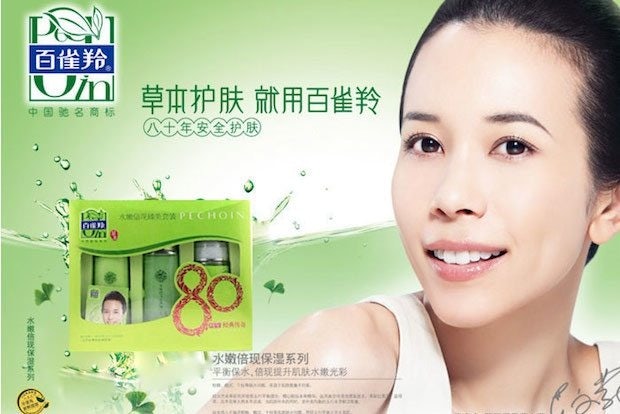
A new report finds that Chinese skincare brands are gaining ground against foreign ones.
As China’s consumer goods market becomes more competitive amidst slowing economic growth, a new Bain study finds that Chinese brands are doing better than foreign ones when it comes to winning over Chinese consumers.
In its recently released 2014 “China Shopper Report,” the global consulting firm takes a close look at the fast-moving consumer goods (FMCG) category, which includes food, beverages, personal care, and home care. It concludes that this “fast-moving” market is actually slowing in China, meaning that brands need to work harder to gain a bigger piece of the market share that already exists rather than hope to bank off growth. As this new reality sets in, Bain finds that Chinese brands have posed formidable competition to foreign companies, causing them to “lose share” in 26 categories examined for the study in 2013.
The growth rate of the FMCG market has slowed considerably over the past few years, dropping from 15 percent in the second quarter of 2011 to 4.6 percent in the first quarter of 2014. This is attributed mainly to a drop in annual spending per household on these goods, which declined from 9 percent in 2012 to 4.6 percent in 2013. Growth is higher in lower-tier cities than in the first tier—the latter only saw 3.5 percent growth in the first quarter, compared to 7.4 percent in Tier 2 and 8.4 percent in Tier 3.
Furthermore, as China’s luxury market slows, the pace of “premiumization” of these types of goods fell dramatically and resulted in a slower rate of price growth.
As a result, brands are spending more time trying to grab a bigger piece of market share to keep growth rates high—and Chinese brands have particularly excelled at this strategy. The study found that across all city tiers, 60 percent of all foreign brands studied lost market share, including those that could be considered in a more “premium” category. For example, fears over food safety after a 2008 scandal over tainted domestic milk turned foreign infant formula into a “luxury” food item. The Bain report finds that protectionist measures by the Chinese government, however, have actually caused foreign brands to lose 2.2 percent share in this category. “Sales were hurt by word-of-mouth unsubstantiated claims of contaminated ingredients,” it says. In the skin care category, foreign brands lost 5.5 percent market share to Chinese companies including Pechoin and Proya.
These losses occurred across the board in first-, second-, and third-tier cities. The report finds that the share decrease was most surprising in first-tier cities, where foreign brand presence in the strongest. There are some categories where foreign brands still reign, however. Foreign brands gained 2.6 percent in the hair conditioner category, giving L’Oreal Paris a boost.
Bain gives three recommendations to brands looking to remain competitive in the slowing market, emphasizing that they can no longer simply hope to ride a wave of growth and need to focus on achieving greater market penetration. The report suggests that companies focus on getting the brand in customers’ long-term memory, create a product portfolio that will appeal in China, and make sure that products are always available when customers are looking for them in order to keep up with domestic rivals.